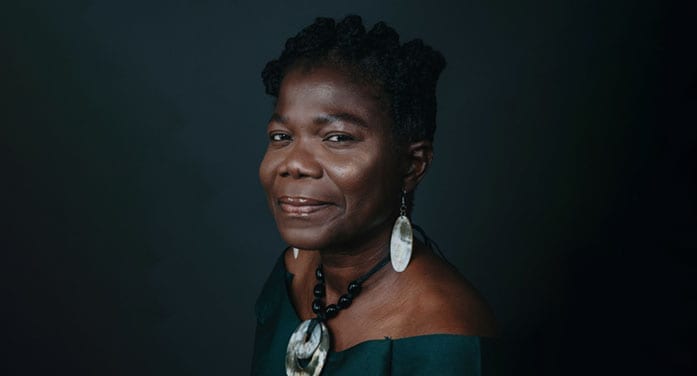Reading Time: 4 minutes

Philomina Okeke-Ihejirika, professor in the Department of Women’s and Gender Studies and director of the Pan African Collaboration for Excellence at the U of A (Photo: Supplied)
The University of Alberta is partnering with three West African universities to mentor and build tomorrow’s diverse community leaders and global intellectuals through a new project.
Powered by a $300,000 grant from the Queen Elizabeth Scholarship (QES) Advanced Scholars West Africa program, the initiative supports research-focused exchanges for doctoral researchers, post-doctoral fellows and early career academics between the U of A and universities in Ghana, Nigeria and Senegal.
The project, On the Path of Social Responsibility and Global Leadership, will give the next generation of scholars the know-how to become effective leaders in their communities and beyond, said project lead Professor Philomina Okeke-Ihejirika of the U of A’s Faculty of Arts.
“Interaction among students and emerging scholars from Canada and Africa diversifies their knowledge base, skills and network, making them truly global intellectuals,” she said, adding that “in an increasingly globalized and virtualized world, these trainees need to see themselves as leaders who are capable of engaging local and global communities for the public good.”
The project will also get young scholars thinking about how to apply their doctorates beyond academic careers in response to growing concerns about finishing PhD studies, she added, noting a 2013 study, for example, showing that 25 to 50 per cent of Canadian doctoral candidates never complete their programs.
“We want to help make students aware of how our values, expectations and prospects for academic work are changing,” said Okeke-Ihejirika. “We need to help them plan for a future which may not be in academia. These students come with a lot of knowledge and skills they can mobilize both within and outside the academy; training in this regard should focus more on pushing out the academy walls so it becomes part of the larger society they should be serving.”
The project is bilingual and blends online and planned in-person delivery – depending on COVID-19 restrictions – and is expected to begin in early 2022 with an enrolment of 32 trainees guided by cross-faculty collaboration, including Campus-Saint Jean and six U of A faculties: Arts, Education, Medicine & Dentistry, Nursing, Rehabilitation Medicine and the School of Public Health.
The program will be piloted through a new Gender Institute for Capacity Building hosted by the U of A, with a focus on feminist, Afrocentric and Canadian Indigenous perspectives on research, leadership and community engagement.
“These approaches also expose students to systemic inequities within and outside academia, and challenge them as privileged voices to speak for others who do not have that voice,” said Okeke-Ihejirika, who teaches in the Department of Women’s and Gender Studies and heads the U of A’s Pan African Collaboration for Excellence.
Bilingual collaboration with Campus Saint-Jean to engage francophone West Africa reflects one of the project’s aims to introduce young scholars to cross-cultural enrichment.
“Africa is a continent that is largely bilingual, and since Canada is bilingual, we should carry that heritage abroad,” said Okeke-Ihejirika, noting that bilingualism is becoming more important as Canada’s immigrant population grows.
The collaboration also helps address inequity in forging academic partnerships, she added.
“Canadian universities tend to go to English-speaking parts of the world to engage English-speaking, longer-standing universities, but we need to invest our resources in both established and emerging institutions.”
The cross-cultural exchange also opens up the students to “other ways of knowing,” she added.
“When African students come here they’ll learn about Indigenous Peoples in Canada, and I know they’ll be excited. Like Canada’s Indigenous Peoples, Africans were equally colonized to see their ways of knowing as inferior. And spending time with students and staff in an African university as well as local organizations is an education in itself for Canadian trainees. This program affords all of the participants an invaluable opportunity to experience life in each other’s spaces and share their perspectives on decolonization and Indigeneity.”
The program has three key elements, starting with research training, exploring how to conduct research through different ways of knowing, and learning how to access, organize and manage data. The other two features focus on leadership and community engagement.
The program also has a “college of mentors” to provide one-on-one supervision among the university partners for each trainee, as well as group mentoring with peers and QES alumni.
Ultimately, the program is about placing students on a path that could transform their lives, Okeke-Ihejirika said.
“It will help students in the choices they make and the responsibility they have to give to society, that they should do more than just publish research. They can use their knowledge to make society better.”
U of A faculty members involved in the project are Michael Frishkopf, Susanne Luhmann and Onookome Okome from the Faculty of Arts, Charlie Mballa and Pascal Lupien from Campus Saint-Jean, Sophie Yohani from the Faculty of Education, Karen Goodman and Janis Geary from the Faculty of Medicine & Dentistry, Solina Richter from the Faculty of Nursing, Erin Pollock from the School of Public Health and Andrea MacLeod from the Faculty of Rehabilitation Medicine.
| By Bev Betkowski for © Troy Media
The views, opinions and positions expressed by columnists and contributors are the author’s alone. They do not inherently or expressly reflect the views, opinions and/or positions of our publication.

